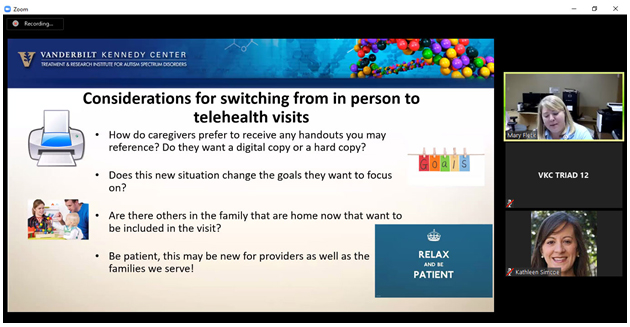Vanderbilt Kennedy Center (TN IDDRC, UCEDD, LEND) produces new webinar trainings amid COVID-19 pandemic
April 21, 2020

|
The rapidly evolving challenges associated with the COVID-19 pandemic have caused countless disruptions for individuals with disabilities and families across the country. In response, the Vanderbilt Kennedy Center's (TN IDDRC, UCEDD, LEND) Treatment and Research Institute for Autism Spectrum Disorders (VKC TRIAD) has developed a variety of resources for individuals with disabilities, families and caregivers, providers, and diagnosticians.
While limited to 500 participants during the live presentations, all are archived on the VKC website. For more information or to view the archives, visit https://vkc.vumc.org/vkc/triad/covid19/:
Telemedicine-Based Autism Spectrum Disorder Assessment in Toddlers
Currently archived
This webinar provides training on an ASD tele-diagnostic triage tool for clinicians to use for families of young children in need of autism assessment and faced with geographic or social distancing barriers. Learn about TELE-ASD-PEDS, a new tool explicitly built for this purpose and under evaluation in an ongoing trial (clinicaltrials.gov, NCT03847337). TELE-ASD-PEDS was designed for diagnosticians to use without need for prior training or standardized materials.
Early Intervention Focused Telehealth Support Series for Providers
Thursdays, 12 p.m. CST until further notice (sessions are archived)
This series introduces the remote delivery of early intervention services to young children with ASD and related developmental delays and disabilities. Through participation in this series, early intervention providers will receive information on the following topics:
- How to access web-based curricula on evidence-based practices to support young children with ASD. Available curricula include communication, challenging behavior, social play, sleep, and toilet training;
- How to best utilize web-based curricula to support families via telehealth;
- Strategies to support remote coaching and consultation with caregivers;
- Ethical considerations for the delivery of telehealth services; and
- Logistical consideration for providers and caregivers establishing telehealth services.
Families First Online Education Series
Thursdays, 1-1:30 p.m. CST until further notice (sessions are archived)
This series for caregivers of young children with autism will include information on topics such as how to schedule your day at home during this time, how to structure specific activities within your day, and how to continue to work on goal areas while services may be paused. Participants are able to attend as few or as many as they would like, as this is not a series.
Ethical Considerations for Delivering ABA Services via Telemedicine
(in partnership with Tennessee Department of Intellectual and Developmental Disabilities)
Currently archived
This webinar provides an introductory overview of key ethical considerations in delivering behavior analytic services via telemedicine. VKC TRIAD regularly uses various modes of tele-practice to reach and support families and educators in rural and low resource communities, and will share foundational information based on lessons learned and a broad expertise across a variety of telemedicine-based programming.
Introduction to use of the Screening Tool for Autism in Toddlers (STATTM): Training overview and discussion of tele-diagnostic applications
Currently archived
The STAT is an empirically based, interactive measure to screen for autism in children between 24 and 36 months of age, with provisional scoring algorithms supporting its use in 3-year-old children and children under 24 months. It is designed for use by a wide range of pediatric providers who work with young children in assessment or intervention settings and who have experience with autism. This webinar is an introduction to use of the STAT, specifically:
- Overview of administration and scoring of 12 items;
- Practice scoring and interpretation of results;
- Explaining results to parents; and
- Diagnostic applications in primary care and telehealth.








